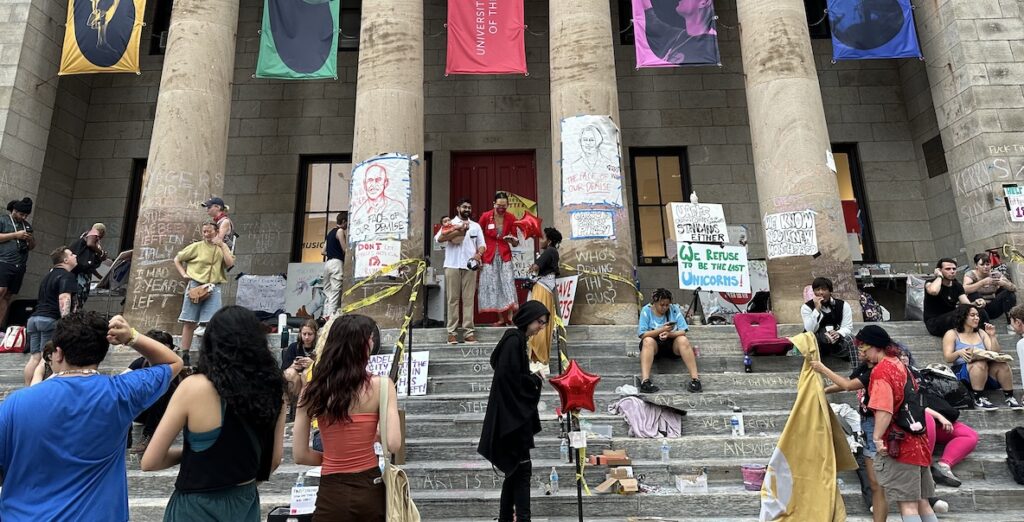The University of the Arts in Philadelphia has been shuttered — with no explanation. Nearly 150 years old and then, silence. The old lady deserved better. There are lessons here.
Lesson One
We are without leaders … or rather without people who understand their roles and responsibilities as leaders. We don’t say that leaders should always succeed; in fact, we often remember them when they don’t succeed: We remember them, and they inspire us when they hang on despite inevitable failure. We do say they should hang on to remind us that the human spirit can only succeed if we’re able and ready to hang on. That is what art is about.
We have former UArts President David Yager, former CFO Stephen J. Lightcap and just previous President Kerry Walk — to mention only a few. They knew — or should have known — what was coming, but they found it easy to let go and leave everyone behind. Shame shame shame on them. When you take on the job of being a leader, you take on more than the title.
Artists are the canaries in the coal mine. What they experience is what we will all experience … sooner or later.
Lesson Two
Our talk about the importance of creativity and the creative community is just talk. It’s the feel good talk we have when things are going well. If we believed the arts were as important as we say they are, we might think about new ways to support these institutions — as we did with the federal bailout of 2008 to rescue of more 1,000 companies and multiple big banks, or did during the depression when we developed the Works Progress Administration program, or did when we devised the Marshall Plan to rebuild Europe after World War II. Or, as we did in the late 50s, when, fearing that the Soviets were beating us in science and innovation, we launched a federal program — National Defense Education Act of 1959 — that provided funding for programs in science and humanities, fellowships and the like.
“By their deeds you shall know them.” And now we know them.
Lesson Three
Builders and investors trump artists and creators. Many are already on site thinking about what they can get at the fire sale. “The possibilities are endless,” Dranoff Properties CEO Carl Dranoff told the Philadelphia Business Journal. “It’s a great portfolio at the heart of the city, amid transit access, walkability, and all of the stuff that makes downtown real estate really strong,” Center City District president Prema Katari Gupta, who also emphasized the need to first and foremost consider the students and staff displaced by the closing, told the Inquirer. An Irish Wake. Let the party begin.
Lesson Four
Artists are the antennae of the race, wrote Ezra Pound. Put differently, they are the canaries in the coal mine. What they experience is what we will all experience … sooner or later. What is happening in arts institutions and programs and increasingly in liberal arts education will happen more broadly. We have overpriced a most important and precious item — the ability to teach our young when they need to know, what they might do, and how the threads of a culture and society are put together.
We are divided by indifference on one side and mania on the other, with greed and incompetence in between. If we do not recall what we value and make it possible for our values to survive, we will regret it.
It’s natural (students are economic animals after all) that they should decide that an average student loan debt of about $38,000 is a burden hard to bear when they are paying tuition of about $56,000/year and entry-level salaries in the arts and humanities are something less than that.
It is time for us to rethink the model for higher education, and for art education specifically — perhaps free education in exchange for public or community service, like last century’s GI Bill, which offered free college tuition to some World War II veterans. Most importantly, we must first believe that education is a public trust not the “private” property of its trustees, presidents, its donors, or even its faculty. With that as a start, we might build a system that works for the community and for the next generation.
The Final Lesson
We are divided by indifference on one side and mania on the other, with greed and incompetence in between. If we do not recall what we value and make it possible for our values to survive, we will regret it. At our back, we can hear time’s winged chariot drawing near.
Neil Kleinman, PhD, JD was the director of the University of the Arts’ Corzo Center for the Creative Economy and is a professor emeritus of innovation and entrepreneurship.
The Citizen welcomes guest commentary from community members who represent that it is their own work and their own opinion based on true facts that they know firsthand.

